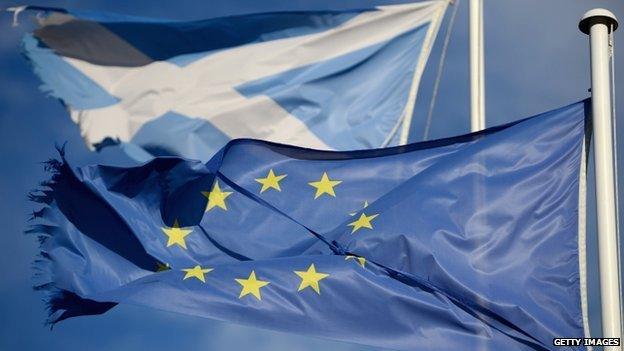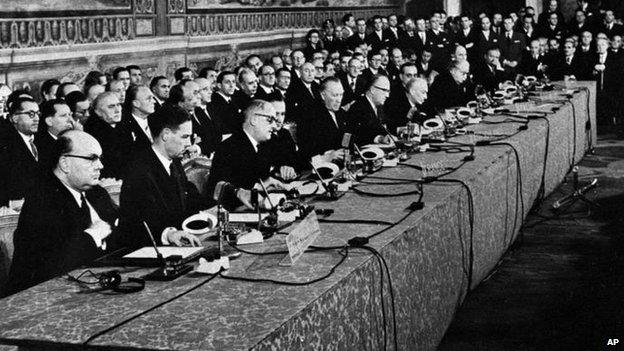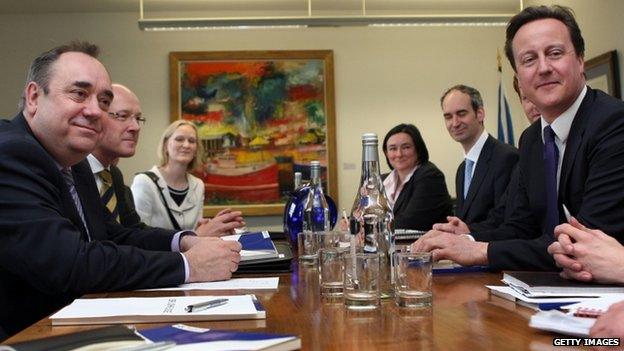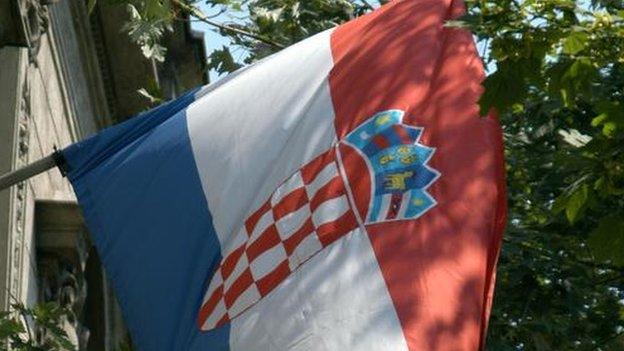Scottish independence: Would Scotland be in the EU after a Yes vote?
- Published

Would Scotland be a member of the European Union if voters said "Yes" in the independence referendum? That question came to the fore this week after First Minister Alex Salmond made a speech at the College of Europe in Bruges.
The Scottish government says it could negotiate entry from within using Article 48 of the Treaties of the European Union.
Pro-Union voices insist the only available option to an independent Scotland would be applying via Article 49.
But what are these articles and do they matter in this debate?

What is Article 48?

This allows the Treaties of the European Union, external - the EU rulebook - to be amended by existing members of the European Union, the European Parliament or the European Commission.
The members submit a proposal to the European Council and if it - after consulting with the parliament and the commission - decides by a simple majority to look at the proposed amendments, then it is passed on to a "convention".
The convention is made up of representatives from member states and from the commission. (All the big guns, really).
They look at the amendment proposed and, by consensus, adopt a recommendation which is put to a conference of member state representatives for approval.

So, how different is Article 49?

This is a more specific provision about the accession to the European Union of new member states.
The applicant country must apply to the European Council, with the European Parliament and national parliaments also being notified.
New conditions and subsequent adjustments to the Treaties need to be agreed between the member states and the applicant state. That agreement is then submitted for ratification by member states.
The applicant country must also agree to the principles laid down in Article 6(1) of the Treaty of the European Union. These are: liberty, democracy, respect for human rights and fundamental freedoms, and the rule of law.

Who is saying what?

Pro-independence - Scotland's Future: Your Guide to an Independent Scotland, external says: "There is, within the EU Treaties, a legal framework by which Scotland, a country that has been an integral part of the EU for 40 years, may make the transition to independent EU membership in the period between the referendum and the date on which Scotland becomes an independent state. Article 48 provides a suitable legal route to facilitate the transition process, by allowing the EU Treaties to be amended through ordinary revision procedure before Scotland becomes independent, to enable it to become a member state at the point of independence.
"There is no Treaty provision that would require Scotland to leave the EU on independence."
Pro-Union - Scotland analysis: EU and international issues (UK Government), external says: "The legal basis for becoming a member of the EU is Article 49 of the Treaty on European Union.
"The Scottish government has stated that its preferred legal basis for joining the EU is the 'ordinary revision procedure' set out in Article 48 of the Treaty on European Union, not Article 49. It is unlikely that member states, which have to agree to any use of Article 48 by consensus, or the commission or the European Parliament, which also have to be consulted, would agree to Article 48 being used in this unprecedented way, given that Article 49 explicitly provides for the process that must be followed for a state to become a member of the EU."

What are the experts saying?

Graham Avery, senior adviser at the European Policy Centre in Brussels and honorary director general of the European Commission: "Article 48 would be the legal basis: this approach is sometimes described as 'internal enlargement'.
"The alternative would be the traditional procedure for EU enlargement, under which non-member countries are admitted; this approach, which means Scotland would have to leave the EU and then apply for membership under Article 49, would be undesirable for practical and political reasons.
"Neither of these legal bases would provide 'automatic' or 'guaranteed' EU membership for Scotland. The question is, which would be the appropriate route? I argue that, if there is one member state above all that will want article 48 to be used, it is the rest of the UK. I predict that, if the result of the referendum is yes, London will become a vigorous advocate of the use of article 48."
Professor Kenneth Armstrong, director at the centre for European legal studies, University of Cambridge: "The argument for the use of Article 49 of the Treaties of the European Union (TEU) would seem substantially more legally plausible than resorting to Article 48 TEU for three main reasons.
"Firstly, the objective which is pursued by Article 49 TEU is to allow for verification that the applicant state can fulfil its obligations arising under EU law. Secondly, the Article 48 TEU procedure is a means for altering the legal relationship between member states. Whatever may be the territorial scope of application of the resulting agreements, they are agreements between 'member states'.
Thirdly, any analysis of Articles 48 and 49 TEU has to give due regard to Article 50 TEU which now contains the 'withdrawal clause'. Introduced by the Lisbon Treaty, external, there is a mechanism and procedure for an existing EU state to withdraw from the EU and to cease fulfilment of its obligations."

Have these articles been used recently?

Article 48: On 25 March 2011, the European Council amended its rule book to establish the European Stability Mechanism, an agency that is able to give financial assistance to countries which use the euro and find themselves in difficulty.
The following paragraph was added to Article 136 of the Treaty of the Functioning of the European Union: "The member states whose currency is the euro may establish a stability mechanism to be activated if indispensable to safeguard the stability of the euro area as a whole. The granting of any required financial assistance under the mechanism will be made subject to strict conditionality."
Article 49: On 1 July 2013, the European Union enlarged for the sixth time by accepting Croatia as a member. The country applied for membership in 2003 and was considered an official candidate the following year. Its negotiations for entry began in October 2005 and ran until June 2011.
Between June 2011 and becoming an official member in July 2013, Croatia had something called "active observer" status in the European institutions. This allowed it to get involved in the decision-making process and become familiar with the working methods in the EU institutions.